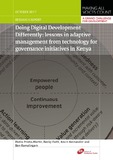| dc.contributor.author | Prieto-Martín, Pedro | |
| dc.contributor.author | Faith, Becky | |
| dc.contributor.author | Hernandez, Kevin | |
| dc.contributor.author | Ramalingam, Ben | |
| dc.coverage.spatial | Kenya | en |
| dc.date.accessioned | 2017-10-13T19:56:39Z | |
| dc.date.available | 2017-10-13T19:56:39Z | |
| dc.date.issued | 2017 | |
| dc.identifier.citation | Prieto-Martín, P.; Faith, B.; Hernandez. K. and Ramalingam, B. (2017) Doing Digital Development Differently: lessons in adaptive management from technology for governance initiatives in Kenya, Making All Voices Count Research Report, Brighton: IDS. | en |
| dc.identifier.uri | https://opendocs.ids.ac.uk/opendocs/handle/20.500.12413/13285 | |
| dc.description.abstract | Development projects don’t always work as planned. This has long been acknowledged by those in the sector, and has led to several approaches that seek to solve complex development problems through enabling and encouraging greater adaptiveness and learning within projects (e.g. Doing Development Differently and Problem-Driven Iterative Adaptation). Digital development projects experience many of these issues. Using technology for transparency and accountability (Tech4T&A) projects in Kenya as case studies, this research analysed the many different theoretical approaches to learning and adaptation, and then tested how these play out in reality. Firstly, the authors conducted an extensive review of the literature on the spectrum of approaches to adaptive learning. The findings were used to develop a framework through which to analyse adaptiveness at the different layers of complexity in projects (e.g. software design and development, programme design and management). The second part of the research consisted of interviews and focus group discussions with members of Tech4T&A projects in Kenya. Respondents helped identify the main characteristics of adaptiveness in Tech4T&A projects (e.g. who needs to adapt, and how and when) and the challenges and issues that inhibit projects’ ability to be adaptive. This process also revealed how accountability interplays with adaptiveness, and considered how better collaboration flows can enable adaptiveness. From a literature review and empirical study, the authors drew several conclusions for increasing adaptiveness in digital development projects. These include simplifying the many adaptive theories that abound, increasing responsiveness to project beneficiaries and stakeholders – and for stakeholders to keep on experimenting, networking and advocating. | en |
| dc.description.sponsorship | DFID | en |
| dc.description.sponsorship | USAID | en |
| dc.description.sponsorship | Omidyar Network | en |
| dc.description.sponsorship | Sida | en |
| dc.language.iso | en | en |
| dc.publisher | Institute of Development Studies | en |
| dc.rights | Attribution-NonCommercial-NoDerivs 2.0 UK: England & Wales | * |
| dc.rights.uri | http://www.ids.ac.uk/files/dmfile/IDSOpenDocsStandardTermsOfUse.pdf | en |
| dc.rights.uri | http://creativecommons.org/licenses/by-nc-nd/2.0/uk/ | * |
| dc.subject | Governance | en |
| dc.subject | Participation | en |
| dc.subject | Technology | en |
| dc.title | Doing Digital Development Differently: lessons in adaptive management from technology for governance initiatives in Kenya | en |
| dc.type | Series paper (non-IDS) | en |
| dc.rights.holder | Institute of Development Studies | en |
| dc.identifier.team | Digital | en |
| rioxxterms.funder | Default funder | en |
| rioxxterms.identifier.project | Default project | en |
| rioxxterms.version | NA | en |
| rioxxterms.funder.project | 9ce4e4dc-26e9-4d78-96e9-15e4dcac0642 | en |

